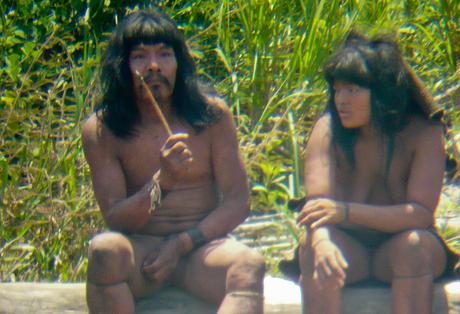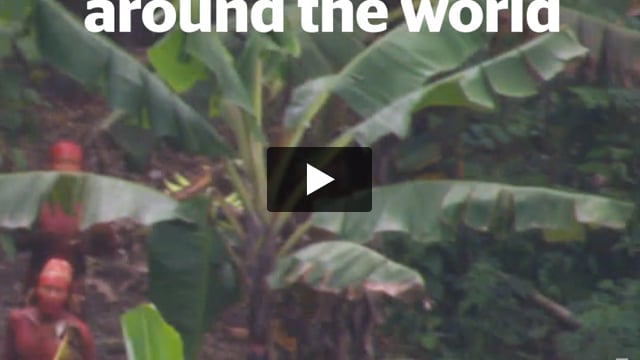Richard Gere blasts the industrial world for treating uncontacted Indigenous peoples as “collateral damage”
October 27, 2025
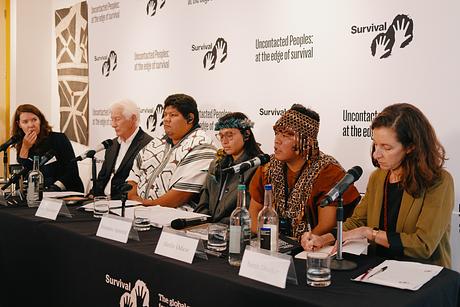
Actor and human rights campaigner Richard Gere spoke at the launch of Uncontacted Indigenous Peoples: at the edge of survival, the first-ever fully comprehensive report on uncontacted peoples. It finds that half will be wiped out within 10 years unless urgent action is taken.
Survival confirmed there are 196 groups of uncontacted peoples living in 10 countries across the world — and all are threatened.
Speaking alongside Indigenous leaders, Gere said:
“How much longer will we in the industrialized world view them as unfortunate collateral damage while we plunder their lands for our cars, our houses, our energy needs, our jewelry, our entertainment?”
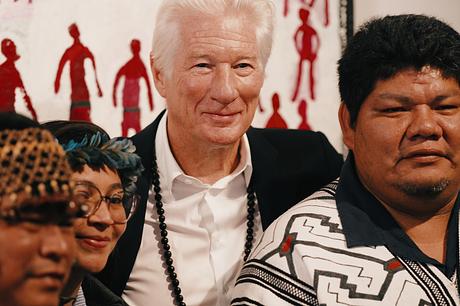
The report, available on the dedicated website uncontactedpeoples.org, reveals — after years of rigorous research by Survival — that more than 96 percent of uncontacted groups face threats from extractive industries, including logging, mining and oil and gas drilling.
Lucas Manchineri, of the Manchineri people of Brazil, spoke forcefully for uncontacted people whom he calls ‘wary people’. “We must support them by telling their stories and showing the world that uncontacted peoples haven’t disappeared. They’re here. They’re fighting in their forest, sometimes silently. We have the spiritual and political obligation to protect them.”
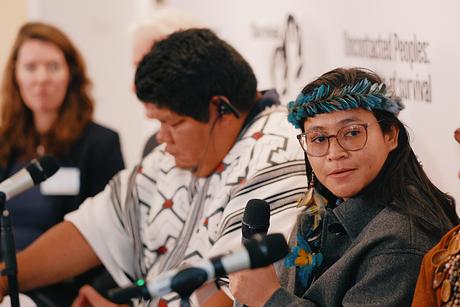
Survival’s research bears out that uncontacted peoples are resisting colonizing attacks – which is their right under international law. When their rights are respected, they survive and thrive.
“Uncontacted peoples are not passive or ignorant. They know about outsiders, they are making a choice to reject and resist contact, and they are powerfully supported by Indigenous neighbors,” said Caroline Pearce, Survival International’s director.
Besides long-standing threats to uncontacted peoples’ lives and territories, such as logging, mining and ranching, new and emerging threats include social media influencers who seek to make “first contact” – most often faked – for content they can monetize. Missionaries, bankrolled by multi-million-dollar evangelical organizations, use technology to find and track uncontacted tribes to convert them to Christianity. Violent criminal gangs increasingly cultivate and traffic drugs or run illegal mining operations deep in the Amazon.
Herlin Odicio, an Indigenous Kakataibo leader from the Ucayali region in Peru also spoke: “We the Indigenous organizations are working to defend their land rights. Because they don’t have people to come out and fight for themselves. They are being made invisible by the government.”
Maipatxi Apurinã, a member of the Pupīkary (Apurinã) people of Brazil summed up: “The failure to acknowledge the existence of uncontacted peoples is a huge violation of their rights …Their right to be protected must exist not only on paper, but in reality.”
Survival’s report is rooted in 50+ years of Survival’s experience and research. It is being published now because the world needs to know urgently about this silent, ongoing genocide. It's a wake-up call.
“I grew up in a country that was built on the misery of indigenous people – America – and I have enormous shame about that. A lot of Americans feel that way.” Gere said at the report launch.
“It was the wrong thing to do. It was cruel. It was unnecessary.”
Key Findings
Survival International reveals — after years of rigorous research — that there are at least 196 uncontacted Indigenous groups, living in 10 countries, in South America, Asia, and the Pacific. The number is the most accurate and up-to-date calculation ever of uncontacted peoples and groups worldwide.
Survival’s research concludes half of the groups could be wiped out within 10 years if governments and companies do not act.
Uncontacted peoples reject contact as a deliberate choice in the face of colonizing attacks – as is their right under international law. When their rights are respected, they survive and thrive.
Threats
Industrial activity such as logging, agribusiness, mining and road-building destroys forests and Indigenous territories, pollutes rivers, destroys homes and facilitates colonization by settlers. The result? Malnutrition, poisoning, starvation, destruction of communities — even when there is no direct contact. A single missionary, oil worker or logger carrying a common disease could wipe out a population. Violent attacks, including killing, are also common. Our original research shows:
- More than 96 percent of uncontacted groups face threats from extractive industries, including logging, mining and oil and gas drilling.
Logging threatens the existence of 65 percent of uncontacted groups - it is the most common threat, and a precursor to other exploitation and destruction. - Mining threatens the existence of more than 40 percent of uncontacted groups.
Almost one third of uncontacted people are threatened by criminal gangs. - Agribusiness threatens the existence of more than 20 percent of uncontacted groups, including cattle ranching that is destroying the Amazon.
- 38 uncontacted groups face annihilation by government-endorsed development projects such as roads, railways and ports.
- One in six uncontacted peoples are threatened by missionaries trying to convert them.
- Nickel mining for electric vehicle batteries risks wiping out an uncontacted tribe in Indonesia.
- Climate breakdown and biodiversity collapse pose a huge threat to people who rely entirely on healthy forests.
Rising threats
- Social media influencers who seek to make “first contact” for content they can monetize through subscribers and advertising.
- Missionaries, bankrolled by multi-million-dollar evangelical organisations, use the latest technology to find and track uncontacted tribes to convert them to Christianity.
- Violent criminal gangs grow and traffic drugs or run illegal mining operations deep in the Amazon.
Resilience of uncontacted peoples
- Uncontacted people are self-sufficient and thrive without contact — as long as their lands are protected and not invaded.
- They are the experts on their forests — drawing everything they need entirely from their environment.
- Groups actively resist contact. They move deeper into the forest, leave signs or traps, and some attack outsiders who come near.
- Studies show that many enjoy robust physical health. Recently contacted people tell us they were happier when they lived in their forests.
Recommendations
- International law recognizes the rights of all Indigenous peoples, including those who are uncontacted. But national laws vary widely in how well they enforce those rights, and implementation is often weak.
- Governments must implement and enforce laws that protect uncontacted peoples and their lands. Those who breach these laws must be brought to justice.
- Corporations must recognize the rights and lands of uncontacted people and ensure that their supply chains are free of materials sourced from uncontacted peoples’ territories.
- Missionaries must not attempt any contact.
Speakers at the report launch:
Richard Gere is a celebrated actor, producer and human rights campaigner
Lucas Manchineri is president of MAPPHA, an organization of the Manchineru people, who have been monitoring their territory to defend the uncontacted Mashco Piro people that live there.
Maipatxi Apurinã is head of land monitoring at COIAB, the organization of Indigenous Peoples of the Brazilian Amazon. She is also head of OPIAJ, the Organization of the Apurina and Jamamadi Indigenous peoples.
Herlin Odicio is an Indigenous Kakataibo leader from the Ucayali region in Peru. He currently serves as vice president of the Regional Organization AIDESEP Ucayali (ORAU). Herlin has dedicated his life to protecting the ancestral territories of his community against the threats of illegal logging, coca cultivation, and mining.
Caroline Pearce, director of Survival International.


